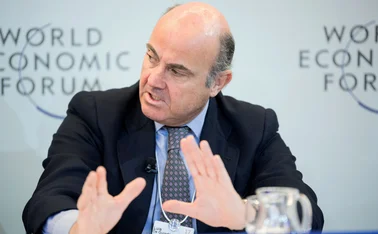
Global custodian of the year: State Street
Pension Service win demonstrates strength of State Street’s custody platform

State Street cemented its position as one of the top-flight global custodians for central banks and other official institutions during the past year. It has also expanded and refined its offerings to help clients deal with an increasingly challenging environment, driven by new regulation, more complex investment products and the difficulties of navigating volatile markets.
Looking after $28.4 trillion in assets under custody and administration as of June 30, State Street has earned a reputation for providing sovereign clients with the investment expertise, information management and flexible operating platforms that enables it to deliver against complex objectives in an efficient and confidential manner. It currently provides clients with access to more than 110 investment markets globally, and has experience in servicing a wide range of asset classes – something that is becoming increasingly relevant to central banks as they diversify their investments.
State Street’s prominence as a global custodian is borne out by the numbers. It has more than 100 official institutional sector clients. Out of these, nearly 30 are believed to be central banks. Moreover, its clients cover a broad spectrum: State Street’s smallest custody mandate is less than $1 million and the biggest is greater than $100 billion.
“We have been using State Street for many, many years and we don’t have any plans to change them,” says Raivo Vanags, head of market operations and reserve management at the Bank of Latvia, which uses State Street as custodian for externally managed reserves that constitute about 10% of the central bank’s $4 billion in reserves. Vanags praised in particular the online tools State Street offers for reconciling the bank’s accounts, which it uses on a daily basis. “We’re happy about State Street. They have improved many things that weren’t as safe before the [financial] crisis.”
“They’ve done a very good job,” adds the head of international markets at a Latin American central bank, which has used State Street as a global custodian for its euro assets – about $7.5 billion, or 22% of total reserves – for several years. “In terms of payments, accounting, register, they have performed very well.”
Others point to strong customer service. "State Street is one of the best, both in terms of services and support," says a senior reserve manager at a large Asian central bank, which has used State Street as its custodian for billions of dollars of its externally managed funds. State Street is said to offer competitive rates as well as fast and accurate reports - and is quick to address any discrepancies or issues unlike some of its peers.
In a business where continuity is prized and reshuffling of mandates are less common than in asset management, State Street has entered into a number of new relationships in the past five years. Despite success in securing new business, State Street’s focus remains on building long-standing relationships. “The value of our approach is demonstrated by the fact that approximately 75% of our new revenue comes from expanding relationships with existing clients,” says Henry Quek, senior managing director and head of official institutions for Asia Pacific at State Street in Singapore.
The value of State Street’s integrated, client-led approach – as well as its ability to handle a complex range of assets – was demonstrated when the company won back a mandate in December 2013 to serve as the custodian of equities on behalf of the South Korean National Pension Service (NPS), which it had lost to Citi a few years earlier.
NPS was using multiple service providers across different investment types and needed a consolidated, customised system to effectively manage its investment data. It also required flexibility to operate multiple accounting funds. Led by its Asia-Pacific official institutions team, State Street created an operating model to service NPS’s split-fund needs. In addition to servicing more than $41 billion in assets, it transitioned the business within an aggressive six-week timeline – the result of months of research, testing and planning with teams around the world.
Quek says focusing on custody as a “core business” has given State Street an advantage over its competitors. “We don’t have a background in investment banking, which has taken a lot of hits over the last few years,” says Quek. “This is our core business. That’s exactly the position we want to have.”
Research also sits at the heart of State Street’s business model and clients can benefit from input from across the larger organisation. Crucially, the firm also invests considerably in its custody business, dedicating large resources to developing its technology platform, a vital component of asset servicing. “Managing data from different fund managers and getting them to speak the same language is a challenge for custodians,” says Quek, who adds the process requires “a lot of customisation”.
While State Street has made acquisitions, such as the purchase of Goldman Sachs’ hedge funds administration business in 2012, it also devotes between 20% and 25% of its annual expenses to technology development. The firm’s new platform, the Enterprise Servicing Platform, which offers a “full self-servicing capability”, went live in early 2014. Integrated with MyStateStreet.com, State Street’s information delivery platform, it allows for the aggregation of data from multiple sources within State Street and combines them with external reference and client data, allowing clients to deal with front-office analytics, risk management, regulatory reporting, client-reporting and exposures.
The Central Banking awards were written by Christopher Jeffery, Robert Pringle, Tristan Carlyle, Daniel Hinge, Arvid Ahlund and Maria Espadinha.
Only users who have a paid subscription or are part of a corporate subscription are able to print or copy content.
To access these options, along with all other subscription benefits, please contact info@centralbanking.com or view our subscription options here: http://subscriptions.centralbanking.com/subscribe
You are currently unable to print this content. Please contact info@centralbanking.com to find out more.
You are currently unable to copy this content. Please contact info@centralbanking.com to find out more.
Copyright Infopro Digital Limited. All rights reserved.
As outlined in our terms and conditions, https://www.infopro-digital.com/terms-and-conditions/subscriptions/ (point 2.4), printing is limited to a single copy.
If you would like to purchase additional rights please email info@centralbanking.com
Copyright Infopro Digital Limited. All rights reserved.
You may share this content using our article tools. As outlined in our terms and conditions, https://www.infopro-digital.com/terms-and-conditions/subscriptions/ (clause 2.4), an Authorised User may only make one copy of the materials for their own personal use. You must also comply with the restrictions in clause 2.5.
If you would like to purchase additional rights please email info@centralbanking.com








